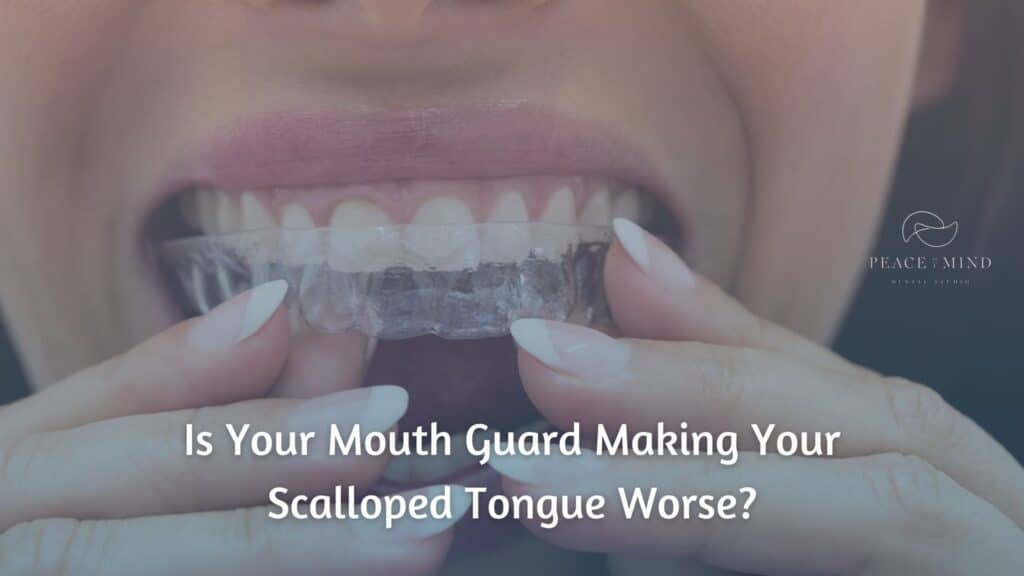
A scalloped tongue can be a source of constant irritation if you don’t get it examined by a dentist in time. The discomfort can affect your daily life, and wearing a mouth guard can make it even worse. A mouth guard is important for patients dealing with sleep apnea or teeth grinding, but is it good for your condition?
If your scalloped tongue isn’t going away, it is time to book an appointment to see if your mouth guard is partially responsible.
This blog explores the causes of a scalloped tongue, the role mouth guards play, and how you can protect your oral health.
What Is a Scalloped Tongue?
A scalloped or crenated tongue occurs when the sides of your tongue develop ridges or indentations. These marks usually result from constant pressure against the teeth. A scalloped tongue might not be painful, but if it doesn’t go away in time, it worsens, causing difficulty eating, chewing, or speaking.
Common Causes of a Scalloped Tongue
There are several potential causes of a scalloped tongue, including:
Teeth Grinding (bruxism): When you grind your teeth, the continuous pressure presses the tongue against the teeth, causing indentations.
Sleep Apnea or Mouth Breathing: Mouth breathing causes snoring, where the tongue rests and blocks the airflow, causing it to swell up and develop ridges.
Nutritional Deficiencies: Nutritional deficiencies in your body also lead to a scalloped tongue.
Dehydration: Lack of proper hydration causes the tongue to swell up, causing a scalloped tongue.
Underlying Medical Conditions: Issues like anxiety or temporomandibular joint (TMJ) disorders also cause a scalloped tongue.
The Link Between Hypothyroidism and a Scalloped Tongue
Hypothyroidism is a condition wherein the thyroid gland doesn’t produce enough hormones. An underactive thyroid can lead to tongue swelling, making it more likely to press against the teeth and develop ridges. Other symptoms indicate that you might have hypothyroidism, such as fatigue, weight gain, or cold intolerance. If you constantly feel fatigued, book an appointment with your doctor to discuss the possibility.
The Role of Mouth Guards in Managing a Scalloped Tongue
A mouth guard plays a crucial role in the life of patients who suffer from sleep apnea and teeth grinding. A properly fitted mouth guard cushions the teeth, preventing excessive pressure on the tongue and minimizing further irritation.
However, the effectiveness of a mouth guard depends on its quality and fit. Ill-fitting or bulky guards can push the tongue against the teeth even more, worsening the problem.
Is Your Mouth Guard Making Your Scalloped Tongue Worse?
It is possible. While mouth guards are designed to protect your teeth and avoid excessive snoring and bruxism, a good fit is crucial. Low-quality mouth guards that don’t fit properly can press harder against the tongue, causing ridges and indentations, which can lead to a scalloped tongue and worsen the condition.
Here are some signs that your mouth guard might be aggravating your condition:
- Increased soreness or swelling in the tongue after wearing the guard
- More pronounced indentations on the tongue
- Difficulty speaking or swallowing with the guard in place
- A painful, scalloped tongue that seems to worsen over time
If you notice these issues, book an appointment with Peace of Mind Dental Studio right away.
What to Do If Your Mouth Guard Is Causing a Painful Scalloped Tongue
Take these steps if your mouth guard is worsening your scalloped tongue:
Book A Dental Appointment: Book an appointment with Peace of Mind Dental Studio, Chandler, and we will determine if your mouth guard is poorly fitted and make necessary adjustments.
Consider A Custom Mouth Guard: If you are using an over-the-counter mouth guard, opt for a custom-made mouth guard that fits you properly.
Address Underlying Problems: If underlying health conditions cause the scalloped tongue, consult your physician regarding the same.
Practice Good Oral Hygiene: Brush your teeth and tongue gently twice daily and use a mouth rinse to reduce bacteria.
Stay Hydrated: Drink plenty of water to stay hydrated and avoid a scalloped tongue.
When to Seek Medical Advice?
While a scalloped tongue goes away on its own, if it doesn’t and causes constant discomfort and you face difficulty eating, chewing, or talking, it’s time to consult us at Peace of Mind Dental Studio. We will schedule a preliminary examination and determine the cause, such as dehydration, hypothyroidism, TMJ disorders, etc. Early intervention can prevent the issue from worsening and help restore comfort.
Final Words
A scalloped tongue can be frustrating, and you should not ignore it if it occurs frequently and causes discomfort. Instead, consult us at Peace of Mind Dental Studio and let us find a solution for you.
Contact us now!
Frequently Asked Questions
Que: Can a mouth guard make a scalloped tongue worse?
Ans: Yes, if your mouth guard doesn’t fit properly, it can press harder against the tongue, causing deeper ridges.
Que: What is the most common cause of a scalloped tongue?
Ans: Teeth grinding and tongue swelling from underlying conditions are the most common causes for a scalloped tongue.
Que: Is hypothyroidism linked to scalloped tongue symptoms?
Ans: Yes, hypothyroidism causes the tongue to swell up, making it press harder against teeth, and causing ridges.
Que: How can I relieve a painful, scalloped tongue?
Ans: Wear a well-fitted mouth guard, drink plenty of water, and practice good oral hygiene to relieve a painful scalloped tongue.
Que: Should I stop using my mouth guard if I have a scalloped tongue?
Ans: No. You must consult us at Peace of Mind Dental Studio for a custom-made mouth guard.


